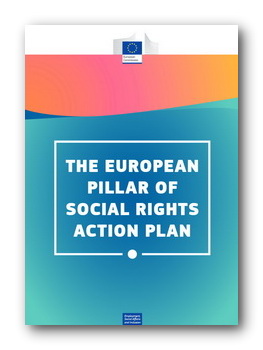 European Commission set out its ambition for a strong Social Europe that focuses on jobs and skills for the future and paves the way for a fair, inclusive and resilient socio-economic recovery.
European Commission set out its ambition for a strong Social Europe that focuses on jobs and skills for the future and paves the way for a fair, inclusive and resilient socio-economic recovery.
The European Pillar of Social Rights Action Plan outlines concrete actions to further implement the principles of the European Pillar of Social Rights as a joint effort by the Members States and the EU, with an active involvement of social partners and civil society. It also proposes employment, skills and social protection headline targets for the EU to be achieved by 2030.
This is an opportunity for Europe to update its social rulebook, while successfully navigating the transformations brought about by new societal, technological and economic developments and by the socio-economic consequences of the pandemic. The Commission has already started to put the Pillar’s principles into action, proposing initiatives such as Youth Employment Support and Adequate Minimum Wages in 2020.
The Commission also presented a Commission Recommendation on Effective Active Support to Employment following the COVID-19 crisis (EASE), to support a job-rich recovery.
EU targets for a common ambition by 2030
The Action Plan sets three headline targets for the EU to be achieved by 2030:
- At least 78% of people aged 20 to 64 should be in employment.
- At least 60% of all adults should participate in training every year.
- The number of people at risk of poverty or social exclusion should be reduced by at least 15 million.
The new 2030 headline targets are consistent with the UN Sustainable Development Goals and set the common ambition for a strong Social Europe. Together with a revised Social Scoreboard, they will allow the Commission to monitor Member States’ progress under the European Semester. The Commission invites the European Council to endorse these three targets and calls on Member States to define their own national targets to contribute to this effort.
Providing Effective Active Support to Employment (EASE)
As a concrete action under Principle 4 of the Pillar, the Commission presented a Recommendation on Effective Active Support to Employment following the COVID-19 crisis (EASE). With this Recommendation, the Commission provided concrete guidance to Member States on policy measures, backed by EU funding possibilities, to gradually transition between emergency measures taken to preserve jobs in the current crisis and new measures needed for a job-rich recovery.
The Recommendation promotes job creation and job-to-job transitions from declining sectors towards expanding sectors, notably the digital and green ones. These new measures should contain three elements:
- hiring incentives and entrepreneurial support
- upskilling and reskilling opportunities
- enhanced support by employment services.
EU funds, including from the Recovery and Resilience Facility and the European Social Fund Plus, are available to help Member States finance their EASE measures.
Background
The European Parliament, the Council and the Commission proclaimed the European Pillar of Social Rights in 2017 at the Gothenburg Summit. The Pillar sets out 20 key principles and rights essential for fair and well-functioning labour markets and welfare systems in the 21st century. The Pillar is structured around three chapters:
- Equal opportunities and access to the labour market
- Fair working conditions
- Social protection and inclusion
Source: ec.europa.eu
 Government of the Republic of Serbia
Government of the Republic of Serbia















 pdf [271 KB]
pdf [271 KB]
Leave a Comment